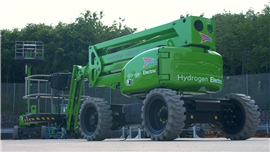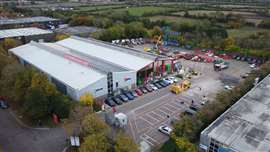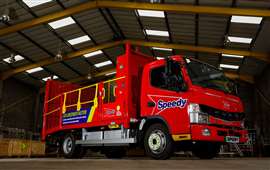Interview: Speedy’s path to sustainability
24 January 2024
In 2023, UK-based Speedy Hire published a net-zero roadmap that outlined how it aims to achieve net-zero across all scopes by 2040. IRN’s Lewis Tyler put some questions to Amelia Woodley, ESG director, about the progress being made by the company.
 A partnership between Speedy Hire and Niftylift saw the manufacture of the world’s first hydrogen-electric powered access platform. (Photo: Speedy Hire)
A partnership between Speedy Hire and Niftylift saw the manufacture of the world’s first hydrogen-electric powered access platform. (Photo: Speedy Hire)
IRN: What sustainability goals has Speedy set?
AW: In 2023 Speedy Hire launched its ambitious ‘Decade to Deliver’ Net Zero roadmap. Within this strategy, we have devised clear, science-based targets with tangible steps to reach Net Zero by 2040, 10 years ahead of the Government deadline.
We aim to reduce Scope 1 & 2 emissions by 50% and Scope 3 emissions by 42% by 2030. Some of our long and short-term goals to help reach these ambitious targets include:
- Replace 100% of petrol and diesel cars within our fleet with electric vehicles (EVs). Transition 66% of diesel vans and 15% of UK-based HGVs to EVs and transition a further 25% of UK-based vans and HGVs to low carbon alternatives like HVO
- Reduce refrigerant leakage by 14% and natural gas emissions by 30%
- Operate on 100% renewable electricity by FY2027 in the UK and Ireland
- Reduce the amount of fossil fuel driven equipment hired to customers by 49%, including an 18% reduction in sold fossil fuels such as petrol, a 68% reduction in sold diesel and a 17% reduction in sold propane
- Utilise policy, engagement and booking process to reduce travel on economy flights by 40%, reduce hotel use by 35% and car use by 45% by encouraging the use of online capability and rail transport/EVs from hire car providers
- Reduce waste by 2% YOY from FY2023 through staff engagement initiatives
- Work closely with our top 30 suppliers to help set their own science-based targets
IRN: How do you plan to achieve these goals?
AW: Following extensive planning and outlining the key objectives of the ‘Decade to Deliver’ strategy, we are now in the process of embedding the roadmap across the business.
To effectively do so, we have taken those objectives and worked with each unit of the business to develop bespoke plans that address their specific needs to reach these goals. We also evaluated which of the targets are most relevant to the different divisions.
For example, working with our Fleet division to evaluate the impact that our goal of replacing diesel and petrol cars with EVs has on the Fleet unit and how it will be managed by the team.
To ensure the success of this embedment, our team members also need the right skills and competencies. To support the team, in addition to company-wide sustainability training, we offer tailored training programmes which cater towards the particular needs of each team. For example, executive training for our Board of Directors.
We also implemented the first ever Sustainable Business Partner Programme in partnership with IEMA to train 30 employees, transforming their jobs into green roles to future proof the workforce and ensure delivery of our key targets.
On an operational level, we have introduced new platforms to assist with the digitisation of data sets, particularly for Scope 3 emissions.
 The company opened a low carbon innovation and rental centre in 2021. (Photo: Speedy Hire)
The company opened a low carbon innovation and rental centre in 2021. (Photo: Speedy Hire)
As we are now working with larger datasets than previously, this technology will support us in developing insights and address the key issues of the business.
This is heavily focused around the supply chain and we are working with suppliers in terms of digital onboarding and digitisation of ESG questionnaires to assess maturity.
We have also implemented an ESG management system that follows a ‘Plan Do Check Act framework’ which ensures sustainability is embedded within the organisation and it follows a framework similar to an ISO Standard.
At Speedy Hire, we like to use the phrase ‘Logic plus Magic equals Change’. By having a sound strategy and combining it with the positive culture and training we offer, this will result in the sustainable change needed to achieve our Net Zero goals.
IRN: What role does data and technology play in achieving your targets?
AW: The role of data has never been more important as it is now. In order to achieve our targets, we must always start with the data as it enables us to gather the right insights and make the right decisions.
We are now dealing with massive data sets and this automation and digitalisation is becoming more important for us in being able to effectively handle the data sets such as whole value chain emissions.
With that in mind, it is therefore crucial for the data to be accurate and verifiable. If the data isn’t correct, then the insights won’t be right which will have further repercussions down the line for achieving our goals.
 Amelia Woodley, ESG director. (Photo: Speedy Hire)
Amelia Woodley, ESG director. (Photo: Speedy Hire)
Innovation in technology will further enable us to reach our net zero goals as we invest more in sustainable solutions such as hydrogen, battery and solar.
When these innovations in place, it will allow us to accelerate decarbonisation across the business and wider industry.
IRN: What is your stance on reducing use of fossil fuels?
AW: While the industry has traditionally used fossil fuels, it is now transitioning towards clean innovative sustainable technologies to respond to net zero challenges.
This is now viewed as a necessity, particularly for Speedy Hire, as the evidence shows that businesses that do not move away from fossil fuels will not be relevant in the long-term.
Moreover, this has become an important issue across multiple key audiences. Clients are looking for clean solutions when choosing who to work with.
From a business perspective, investors are evaluating companies’ assets and whether they are low emissions and renewable.
Finally, from a workforce perspective, at Speedy Hire, our employees also want to know what our commitment to sustainability is and how we are moving away from fossil fuels.
IRN: What role does the rental industry have in reducing emissions and promoting sustainability?
AW: The construction industry makes up nearly 40% of global emissions (United Nations Environment Programme, 2023) and the rental sector plays an important role in helping industry decarbonise as it plays a key part when looking at the bigger picture.
Where the focus was previously on decarbonising large-scale elements such as steel and concrete, the industry is now looking at plant and the equipment and how this can be made more sustainable.
Here, the hire industry has the opportunity to leverage its strong credentials in sustainability and demonstrate leadership.
It is important to highlight that the rental industry itself is intrinsically sustainable. Circularity is at the heart of industry, reflected in the core practice of renting an item and returning it rather than making a single-use purchase, whether it be on a personal or business level.
This model by its very design promotes sustainability and the circular economy, which is also recognised by the investor market as being a crucial tenet of the pathway to net zero. Without the circular economy, there is no pathway. As a result, the hire industry has a huge role to play.
IRN: What are your thoughts on announcements made at COP28?
AW: As with any discussion around climate change, there will be divided opinions on COP28. However, it is important to acknowledge the progress made in terms of having those discussions.
 The Fuso eCanter electric trucks are fitted with six 13.6kWh lithium-ion batteries and have a range of 100km. (Photo: Speedy Hire)
The Fuso eCanter electric trucks are fitted with six 13.6kWh lithium-ion batteries and have a range of 100km. (Photo: Speedy Hire)
Looking back on the past five years or so, we have moved from people slowly accepting that climate change is an issue to having these key issues being actively discussed and debated on an international level by the highest level of global leadership.
There is a delicate balance between transitioning away from fossil fuels at a pace that is sustainable for all countries however, we have come a long way and that must be recognised.
STAY CONNECTED



Receive the information you need when you need it through our world-leading magazines, newsletters and daily briefings.
CONNECT WITH THE TEAM








